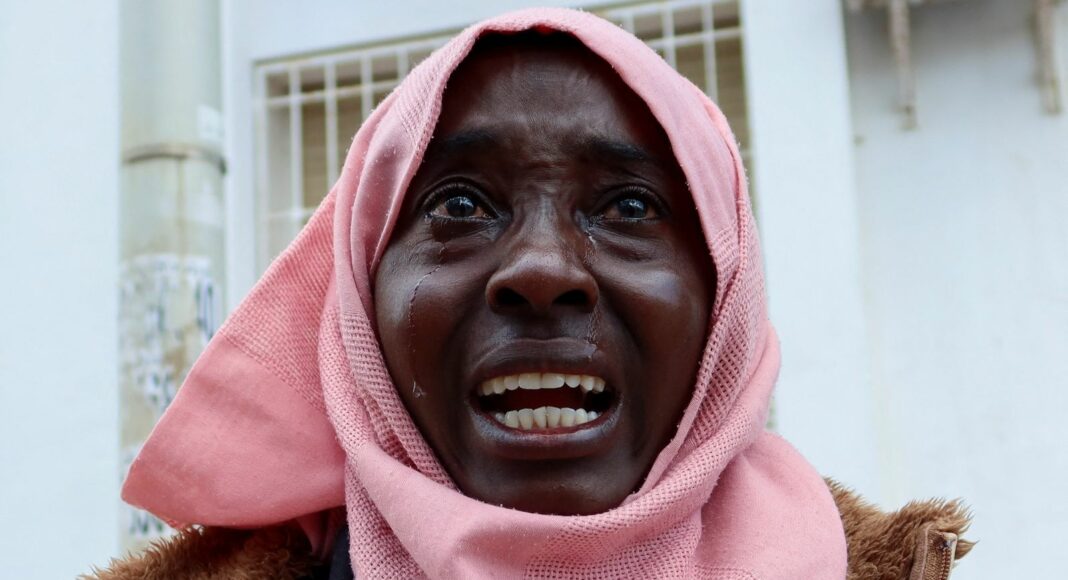Tunisia needs to “protect migrants” because it is “part of our DNA” and the country’s new parliament will be “dealing with this issue”, the nation’s foreign minister has said.
Nabil Ammar spoke to Sky News weeks after a rise in violence against black migrants was attributed to comments made by Tunisia’s President Kais Saied.
Mr Saied had used a national security council meeting to describe “hordes of illegal migrants” as the source of “violence, crime and unacceptable acts” and a threat to the country’s national identity.
Thousands of sub-Saharan African migrants have since faced eviction, unemployment and arrest as authorities moved to act against undocumented migrants.
Image:
A Sudanese refugee cries during a protest asking for evacuation from Tunisia
Protests followed in Tunis condemning the president’s comments as hate speech and decrying the uptick in racialised attacks.
There has also been an influx in migrant crossings from Tunisia to Europe with dozens of them dying as they try to make the perilous journey.
Speaking in a grand reception room of gilded marble on the upper levels of Tunisia’s palatial foreign ministry, Mr Ammar said his country is committed to protecting sub-Saharan African migrants.
“We need to protect migrants,” said the former ambassador to the European Union, Belgium and the UK. “It is part of our DNA to protect them and our commitments internationally, of course, nationally as well.
“But also we are doing our best in order to survey our coasts and to make sure that nobody is tempted to illegally cross the sea from our side.”
He added: “This requests a lot of financial resources but also human resources and we cannot have those all the time at the appropriate level.”
Last week, the national coast guard said it stopped 80 boats headed for Italy and detained more than 3,000 people.
The statement confirmed 29 dead but the actual number of people who died is expected to be much higher.
Image:
Migrants gesture and carry banners during a protest asking for evacuation from Tunisia
Image:
A pro-migrant protester holds a banner which reads ‘feminist, Tunisian, African’
Earlier this month, the World Bank suspended talks with the country and the International Monetary Fund (IMF) delayed the final approval of a $1.9bn (£1.54bn) loan to Tunisian authorities – saying it was worried about violence against sub-Saharan migrants.
The foreign minister believes the president’s comments were taken out of context and intentionally inflamed by third parties.
“We have really acted on all fronts as quickly as we could because we had the impression that we were facing a real machine that just exploded in our face,” he said.
“We were frustrated and we thought it was an unfair trial.”
Read more:How Tunisia has become the deadly route of choice for migrants trying to make it to Europe
3:41
Tunisia-Italy crossings a ‘disaster’
Political analyst Tarek Kahlaoui argues that Mr Saied’s administration has fallen into the trap of conspiracist discourse during a time of economic strife – with sub-Saharan African migrants the latest in a series of political weapons against him.
“He should have basically admitted that and just moved on,” says Mr Kahlaoui.
“Most importantly, he should focus now on making it transparent to have a public policy about immigration in Tunisia especially that European ministers are going to come in by the end of April and they’re going to discuss that with the Tunisian government.”
Tunisia’s laws governing illegal migration and human smuggling are notoriously strict and sanction anyone proing assistance or failing to report undocumented migrants – including medical staff, humanitarian workers, legal advisers and family members.
Image:
Nabil Ammar sat down for an interview Sky News
A fisherman on the central east coast who saved 19 migrants from drowning last week is currently being investigated for human trafficking under the Organic Law 2004 to 2006.
There is currently no national legal protection framework dedicated to regulating the status of sub-Saharan African asylum seekers in Tunisia.
The foreign minister insists that new protective legislation is on the way.
“We now have a new parliament that will be dealing with this issue among others,” he said. “Besides that, Tunisia is respecting all the international commitments of the country when it comes to the protection of migrants.”




